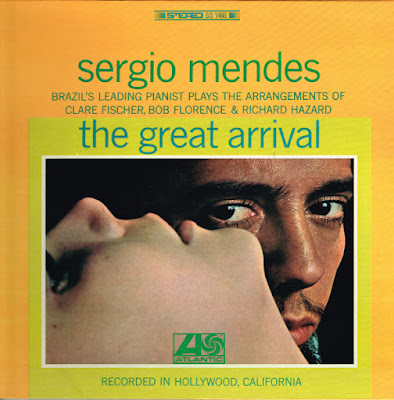Sergio Mendes & Brasil '66
1968
Fool On The Hill
01. Fool On The Hill
02. Festa
03. Casa Forte
04. Canto Triste
05. Upa, Neguinho
06. Lapinha
07. Scarborough Fair / Canticles
08. When Summer Turns To Snow
09. Laia Ladaia (Reza)
Bass – Bob Matthews
Drums – Joao Palma
Guitar – John Pisano
Percussion – Jose Soares
Piano – Sergio Mendes
Vocals – Janis Hansen, Lani Hall
One of our favorite albums by Sergio Mendes & Brasil 66 – a perfect bridge between the simple pop of earlier records, and the group's expanding sound as the 70s approached! The warmly glowing Brasil 66 style is still very strongly in place, but the music here is all a bit hipper – tunes that show the growing sophistication of Brazilian music in the post-bossa years – picked up on by Sergio, and reworked for a larger audience in the US! The record's got some incredibly wonderful material – including a sublime cover of "Upa Neguinho", plus versions of "Casa Forte", "Canto Triste", "Lapinha", and "Laia Ladaia", a song that's a perfect fit for the group's unique style! Also includes the dreamy number "When Summer Turns To Snow", and the group's classic cover of "Scarborough Fair"!
Having hit upon another smash formula -- cover versions of pop/rock hits backed by lavish strings, a simplified bossa nova rhythm, and the leader's piano comping -- Sergio Mendes & Brasil '66 produced two more chart-busting singles, again turning to the Beatles for sustenance with the title track (number six) and Simon & Garfunkel for "Scarborough Fair" (number 16). But again, the bulk of the album was dominated by Brazilians, and by one in particular: the hugely gifted Edu Lobo, whose dramatic "Casa Forte" and infectious "Upa, Neguinho" were the best of his four songs. The tracks were longer now, the string-laden ballads (arranged by Dave Grusin) more lavish and moody, and Lani Hall emerged as the vocal star of the band, eclipsing her new partner, Karen Philipp (although Hall is upstaged on "Lapinha" by future Brasil '77 member Gracinha Leporace). Even though he had become thoroughly embedded in the consciousness of mainstream America, Mendes still managed to have it three ways, exposing first-class tunes from little-known Brazilian talent, garnering commercial hits, and also making some fine records. Cultural note: the striking foldout cover art, depicting Brasil '66 at sunset seated on top of a nude woman, somehow made it past the uptight censors of the day and no doubt boosted sales; it was Mendes' highest-charting album at number three.












